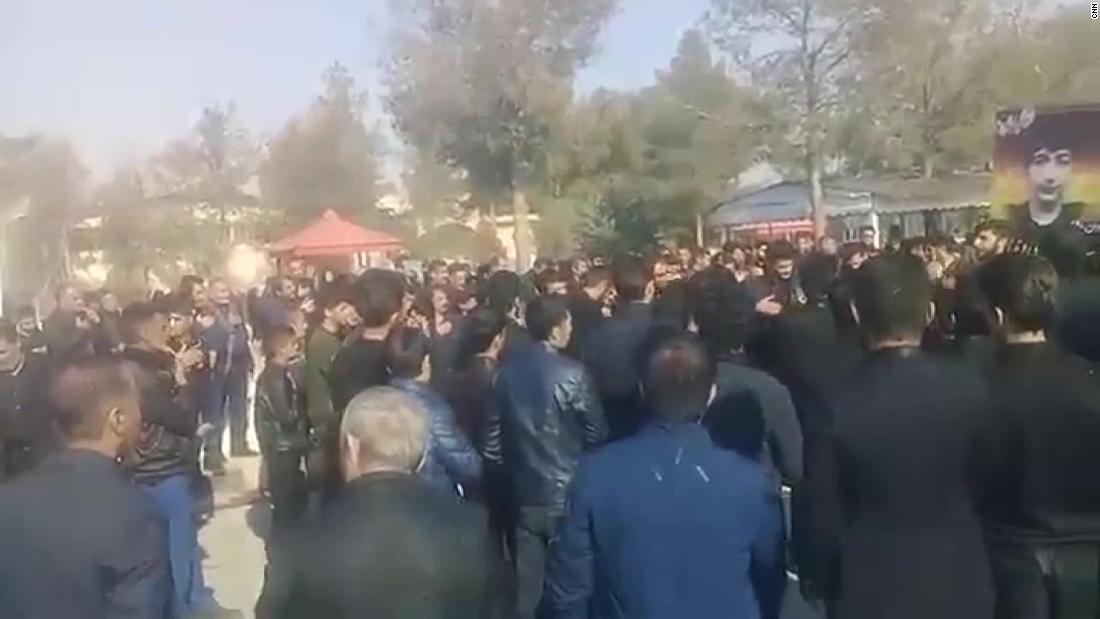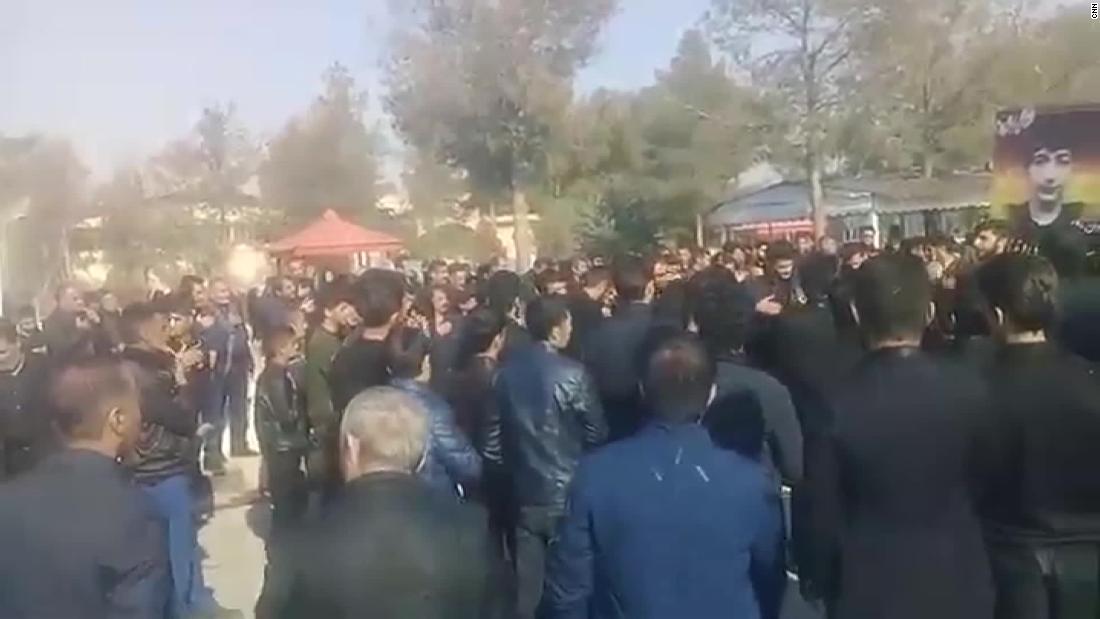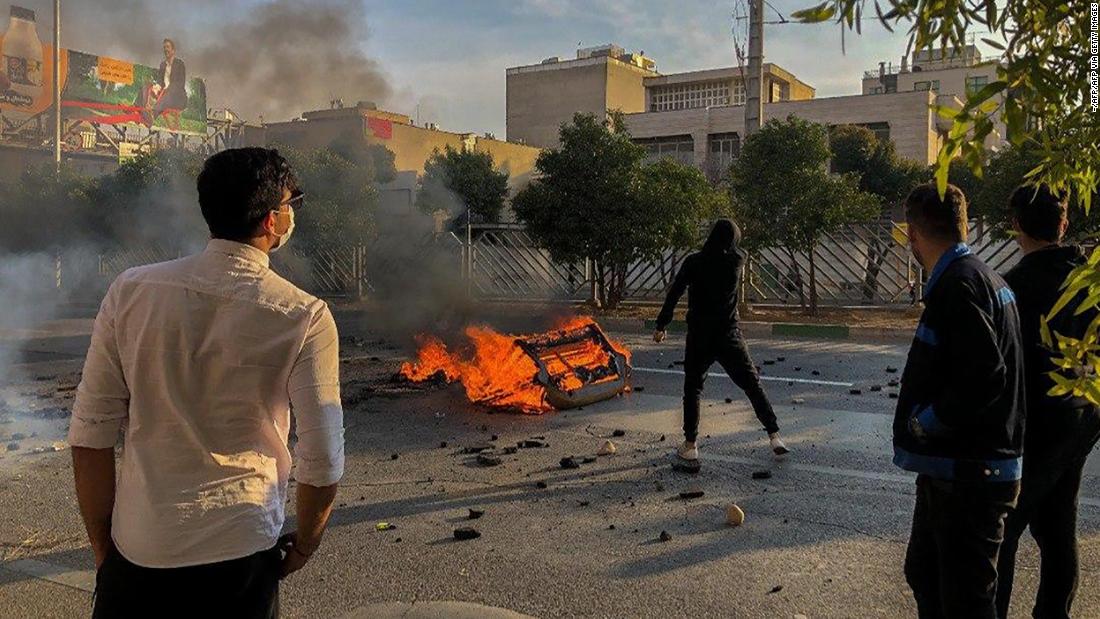Iranians honor their dead in the face of government clampdown

(CNN)The Iranian government has banned the families of protesters killed during anti-government unrest in November from organizing any kind of funeral service or memorial for their children or loved ones.
Eyewitnesses told CNN that several people were arrested by Iranian authorities in Behesht-e-Sakineh cemetery in Karaj, about 60 kilometers (37 miles) northwest of the capital Tehran.
Poya Bakhtiatri’s family and friends tried to visit his grave at the cemetery to mourn the 40th day of his death, but the ceremony was interrupted by government plainclothes forces and a helicopter flying over the cemetery to disrupt.
Poya, 27, was hit by a bullet during a November 16 demonstration in Mehrshahr, a district of Karaj, his mother, Nahid Shirpisheh, told the Center for Human Rights in Iran. She told the CHRI she believes government forces shot him
“They aimed at my son’s head and deliberately killed him,” she said.
She was with her son and daughter at the demonstration in November, she told the CHRI. They were holding hands until government forces fired tear gas into the crowd.
“When they fired tear gas at us, my eyes started to burn and we got separated in the chaos,” she said. “That’s when I almost lost Poya but he called me and asked where I was. I told him he shouldn’t worry.”
Nahid Shirpisheh said her son was walking ahead of her but “10 minutes later I saw my son being carried by some people. We took him to the hospital and he died right there.”
Poya’s parents were arrested December 17 after they told the authorities they were going to hold a ceremony for their son on the “40th day” of his death.
Iranians mourn their dead on the third, seventh and 40th days after a death. These commemorations are a fundamental part of Iranian culture and the Muslim world.
Iran’s semiofficial News Agency, Mehr News, confirmed the arrest of Poya’s family and said they were arrested “to prevent the continuation of the killing and repetition of armed actions against the people.”
US Secretary of State Mike Pompeo condemned Poya Bakhtiari’s killing, saying, “The U.S. strongly denounces the arrest of Pouya Bakhtiari’s parents, and calls for their immediate release. It’s time for the international community to stand together with the Iranian people and hold the regime accountable.”
After the government arrested the entire family, Poya’s grandmother made a public plea to free her family.
She said in a video circulating on social media that “they killed my grandson, my Poya, they killed Poya.” She said they came to arrest her children “my Manucher, my Mehrdad, my daughter-in-law, my grandchild. They took them all. Tomorrow is my Poya’s 40th and I don’t know where my children are, what can I do?”
In November, the government announced a sudden gas price hike that ignited mass demonstrations across Iran. The government response was quick and brutal, pulling the plug on the internet and unleashing what Amnesty International described as a “bloody clampdown.”
The government never published the official death toll or the number of injured, but according to human rights organizations more than 400 people were killed by government forces.
The Iranian government continues to control the information flow to the outside world by exercising internet blackouts.
The internet monitoring service NetBlocks said some mobile networks in Iran were down to 5% of ordinary levels.
“Mobile internet connectivity has fallen further in #Iran amid reports of security reinforcement; real-time network data show connectivity at 5% of ordinary levels on specified networks after four distinct cuts,” it wrote on Twitter.
On Friday, security was heavily enforced near the University of Tehran and near the British, Russian and French embassies, eyewitnesses said.
In early December Mir Hossein Mousavi, the Iranian opposition leader who spearheaded the 2009 Green Movement in Iran, compared the country’s current supreme leader to the Shah who was overthrown in 1979 after massive uprising in Iran.
Read more: https://www.cnn.com/2019/12/28/middleeast/iran-mourners-crackdown-intl/index.html



